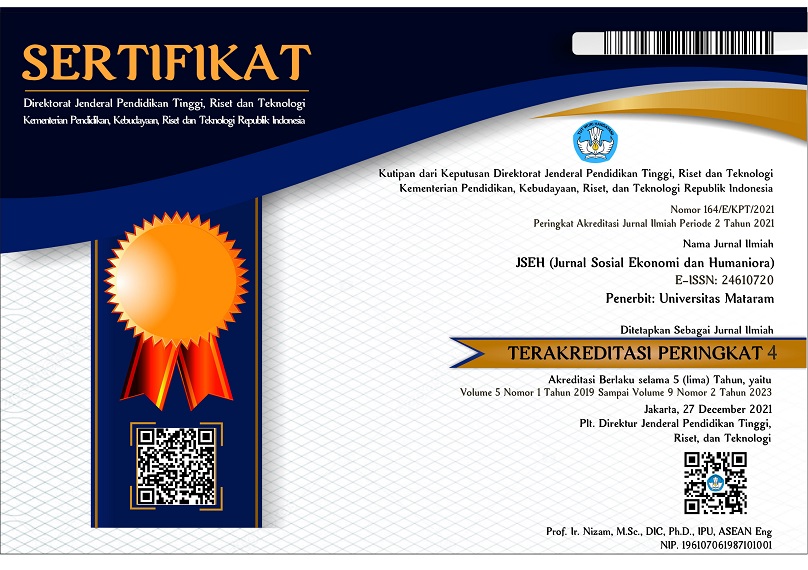Analisis Daya Dukung Lahan Pertanian di Desa Penyangga Kawasan Ekonomi Khusus Mandalika - Kabupaten Lombok Tengah
DOI:
https://doi.org/10.29303/jseh.v9i1.314Keywords:
Special Economic Zone, Mandalika, Land Supporting Capacity, Land agricultural, WelfareAbstract
The Mandalika Special Economic Zone in Central Lombok Regency plays a role in accelerating the distribution of national economic development in the region and strengthening the economy of the surrounding village communities. This study aims to analyze the carrying capacity of food crop farming land to farmer households in the buffer village of the Mandalika Special Economic Zone. The research method is descriptive and data collection using survey techniques. The research location is in the food crop center supporting villages (Sengkol, Rembitan and Sukadana villages) and the respondents are 45 farmers. (criteria for poverty in Sajogyo and the World Bank) and technical support using the Carrying Capacity Ratio formula. The results showed that the economic carrying capacity equivalent to rice was 312.52 kg/capita/year or US$ 0.55/capita/day and the welfare of farmers was classified as poor. The contribution of economic carrying capacity to the ability to fulfill staple food of farmer households is 65.11%. The carrying capacity of the land is technically high (CCR=1.99) so that the land is still able to: support the life of the population and receive additional population, as well as the development of food crop agriculture which is expansive and explorative in nature. Each farming household can have a planting area that is 1.2 ha larger than the average land ownership. Farming households can own a planting area of 1.2 ha larger than their average land ownership. In order for the carrying capacity of food crop farming land to prosper farmers, it is necessary to develop expansive and exploratory land, especially in the dry season and limit the conversion of agricultural land to food crops due to population growth in the buffer villages of KEK Mandalika - NTB.
References
Arham. A.K, 2019. Konflik Dalam Pembangunan Kawasan Ekonomi Khusus (Studi Kasus Akumulasi Melalui Perampasan Dalam Konflik Lahan di Kawasan Ekonomi Khusus Lombok Tengah). Universitas Brawijaya; http://repository.ub.ac.id/180626/ Malang
Ardana, IGL., Wahyunadi, Karisman, P.,Manan A.,dan Mustain 2020. Kesiapan Masyarakat Desa Sekitar Lawasan Ekonomi Khusus (KEK) untuk berkontribusi Dalam Pengembangan KEK Mandalika Kabupaten Lombok Tengah. Dalam Jurnal Ekonobis, Fakultas Ekonomi dan Bisnis Unram. Vol 6. No. 2 (2020): EKONOBIS, September 2020. https://ekonobis.unram.ac.id/index.php/ekonobis/article/view/50
Ayu, C., Wuryantoro dan Supartiningsih, S. 2014. Model Penanggulangan Kemiskinan Berbasis Aktualisasi Potensi Produktif Ibu Rumahtangga dan Anak Perempuannya di P. Lombok (Kasus: Masyarakat Petani Lahan Kering). Makalah pada Seminar Nasional Pengelolaan Lahan Terdegradasi untuk Menjamin Keamanan dan Ketahanan Pangan. Unram-Mataram.
Ayu, C., Wathoni, N., Wuryantoro, Ibrahim dan Mundiyah, I. 2020. Evaluasi Model Akselerasi Swasembada Kedelai di Wilayah Lahan Kering Lombok Tengah. Laporan Penelitian. Fakultas Pertanian. Unram. Mataram.
Ayu, C,. Wuryantoro dan Nursan, M, 2021. Analisis Potensi Berswasembada Pangan Kabupaten Lombok Tengah, Propinsi NTB dalam Jurnal Media Agribisnis. Volume-5, Issue-2, November 2021; https://doi.org/10.35326/agribisnisv5i2.1622
Badan Pusat Statistik. 2021. (Metode Baru) IPM Kabupaten/Kota Periode Tahun 2019 - 2021 di Propinsi NTB. Mataram.
BPS Kabupaten Lombok Tengah, 2020. Kecamatan Pujut Dalam Angka. BPS Kabupaten Lombok Tengah. Praya
BPS Kabupaten Lombok Tengah; 2021; https://lomboktengahkab.bps.go.id
Bank Dunia, 2021. Garis Kemiskinan di Indonesia; https://www.wordbank.org.contry
Dewan Nasional Kawasan Ekonomi Khusus Republik Indonesia, https://kek.go.id.
NTB SATU DATA; datantb.go.id; https://data.ntbprov.go.id.>dataset.
Riayadi dan Dedi, S. 2003. Perencanaan Pembangunan Daerah: Strategi Menggali Potensi Dalam Mewujudkan Otonomi Daerah. PT Gramedia Pustaka Utama. Jakarta.
Rahardjo, M. 1997. Pengantar Ekonomi Sumberdaya Alam. Fakultas Ekonomi
UNS Surakarta :UNS Press.
Soemarwoto, O. 1997. Analisis Mengenai Dampak Lingkungan.Universitas Gajah Mada Yogyakarta.
Sumodiningrat, G. Santosa, B. dan Maiwan, M. 1999. Kemiskinan: Teori, Fakta dan Kebijakan. Edisi Pertama, Penerbit IMPAC. Jakarta.
Suratiyah, K. 2006. Ilmu Usahatani: Pengetahuan Terapan tentang Cara-Cara Petani atau Peternak. Penerbit Swadaya. Jakarta
Downloads
Published
How to Cite
Issue
Section
License
Copyright (c) 2023 Wuryantoro Wuryantoro, Candra Ayu, Nurtaji Wahoni, Ibrahim Ibrahim, Dewi Mandalika

This work is licensed under a Creative Commons Attribution-NonCommercial 4.0 International License.








